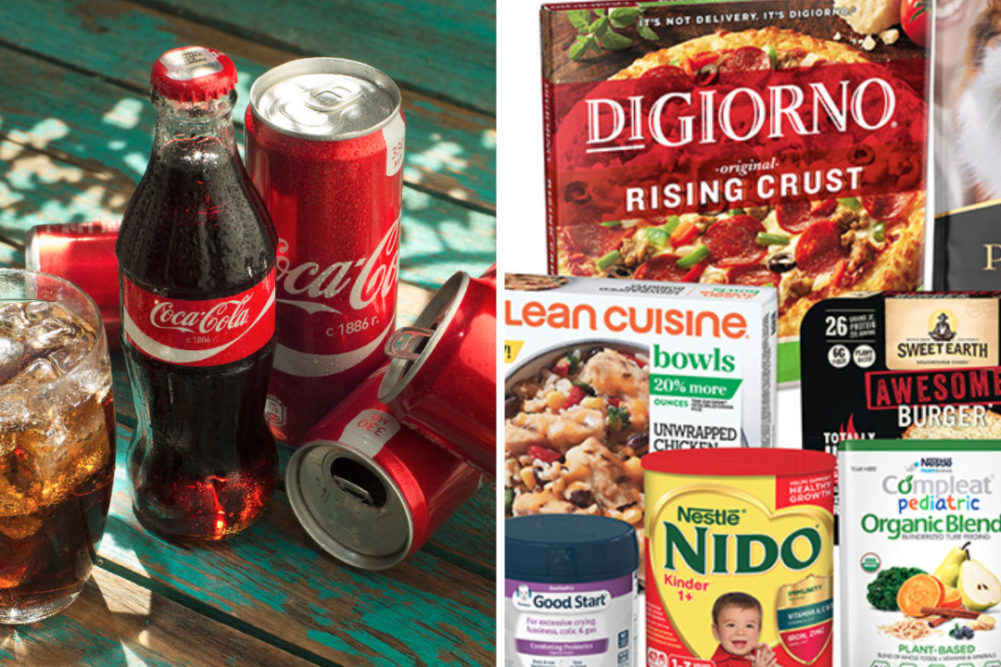LONDON — When it comes to brand value, Coca-Cola Co. and Nestle SA set the bar, according to “Food & Drink 2021,” a new report from Brand Finance, an independent brand valuation and strategy consultancy.
Brand Finance calculates the value of brands by examining a variety of factors, including brand strength, royalty rate and brand-specific revenues.
“The COVID-19 pandemic has put a huge amount of pressure on the food and drink industry globally, from disrupted supply chains and panic buying, to a complete change in consumer habits,” said Savio D’Souza, valuation director at Brand Finance. “The result of this has led to the majority of brand values suffering this year across the sector. The future is not bleak, however; brands with high levels of familiarity and reputation are likely to bounce back successfully as we begin the return to normality.”
The highest-ranking company in the food sector during the past year was Vevey, Switzerland-based Nestle, which had a brand value of $19.4 billion in 2021, down slightly from $20.3 billion in 2020, according to Brand Finance. The company also ranked No. 1 in total food and beverages with a total brand value of $65.6 billion, boosted in part by pet care and non-alcoholic beverages.
“Despite the pandemic, the food giant has posted its third consecutive year of organic growth, profitability, and return on investment capital,” Brand Finance said. “The sheer size, presence, and experience of the company in the sector has allowed it to successfully adapt to the ever-changing and challenging landscape.
“According to Brand Finance’s Global Brand Equity Monitor, Nestle has increased its scores in the consideration metric, as well as improving its score for the community and environment metrics under the CSR measurement. With a continued focus on product innovation and R&D, Nestle is spearheading changes to reflect the current consumer trends, from its product Smarties becoming the first major global confectionery brand to switch to recyclable paper packing, to announcing the launch of a vegan KitKat.”
Yili Group, Hohhot, China, was the second most valuable food brand in 2021 at $9.6 billion, followed by Danone at $8.2 billion, Kellogg Co. at $6.7 billion and Lay’s at $6.6 billion, according to Brand Finance.
On the beverage side, Atlanta-based Coca-Cola was named the world’s most valuable soft drink brand, according to Brand Finance. The ranking comes despite a 13% decline in brand value during the year to $33.2 billion. Even with the decline Coca-Cola still holds a sizable advantage over PepsiCo, Inc., Purchase, NY, which registered a brand value of $18.4 million during the year.
In the overall food and beverage category Coca-Cola claimed the third position with a cumulative brand value of $48.6 billion, which trailed Nestle and PepsiCo, which ranked No. 2 with a total brand value of $59.3 billion, according to Brand Finance.
“With a rich 129-year long history, Coca-Cola is still the most consumed soda in the world, with a staggering 1.9 billion servings, across 200 countries, enjoyed each day,” Brand Finance said. “As with other brands globally, however, the brand’s parent company has not been immune to the impact of COVID-19, with the multinational forced to restructure and cut over 2,000 jobs.
“Coca-Cola continues to strive towards its CSR responsibilities, recently announcing its partnership with The Ocean Cleanup’s River Project, where it will utilize its global network to tackle the amount of plastic entering the oceans. This is just the latest prong in the company’s wider vision for a ‘World Without Waste.’”
Elsewhere in the report, Brand Finance said Dr Pepper and Red Bull were the fastest and second-fastest growing soft drink brands in 2021, recording a 40% and 15% brand value increase, respectively. Lindt was ranked the most valuable chocolate brand, climbing 21% to a brand value of $3.1 billion.
The United States staked claim to 39 of the 100 food brands, with a combined brand value of $79.6 billion. Switzerland and China both had 10 brands on the list, accounting for brand values of $33.1 billion and $29.5 billion, respectively.
An executive summary of the report is available here.

